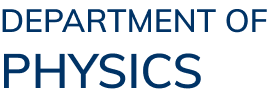
BSc in Physics (4-year cohort students)
The BSc in Physics program provides a solid physics curriculum for students with different career aspirations. The basic program in physics includes courses such as classical mechanics, electromagnetism, quantum mechanics, statistical mechanics and laboratory courses. For students aiming for further studies such as PhD in physics or related fields, they have the opportunity to take advanced courses to build a solid foundation and are encouraged to seek opportunities in undergraduate research. For students with other career goals, the curriculum provides training of analytical skills that will help the students meet challenges in all sectors of society. The curriculum is flexible so that a significant fraction of our students choose to pursue a minor in other subjects in addition to the major degree in physics.
- University Common Core Program Requirements
- Program Catalog
- Course Catalog
- Undergraduate Student Guide
- Academic Standards
- Assessment of Students
Intended Learning Outcomes (ILOs):
- (Knowledge) Explain the scientific principles and methodologies of physics and related scientific disciplines at the university level, with emphasis on advanced theoretical physics.
- (Execution) Apply these scientific principles in conjunction with quantitative reasoning methods and experimental and information technology skills to analyze and solve practical problems.
- (Judgment) Evaluate information and make independent judgments through the application of scientific principles and reasoning methods.
- (Communication) Communicate effectively about physics to both lay and expert audiences, utilizing appropriate information and communication technology.
- (Autonomy) Demonstrate self-direction in tackling and solving problems and act autonomously in planning and implementing tasks.
- (Interpersonal skills and leadership) Collaborate effectively in a team.
- (Self-reflection) Conduct self-evaluation and continuously enrich themselves through lifelong learning.
- (Appreciation of Science) Convey to lay audiences an appreciation of the value of science and the scientific method.
- (Ethical practice) Recognize and comply with scientific standards and ethical practice, and recognize the importance of being a responsible citizen and of ensuring a sustainable environment.
- (International outlook) Use a global perspective in conjunction with scientific knowledge to address issues of importance in physics and society.
